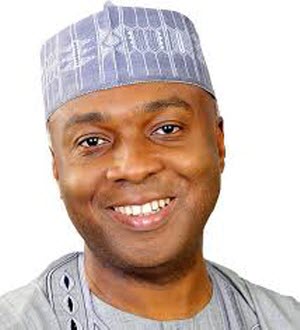There are no products in your shopping cart.
| 0 Items | £0.00 |

 SENATE president Bukola Saraki has sacked 98 of his assistants in a move described as a drive to achieve efficient service delivery and cull the over-bloated bureaucracy that runs his official office.
SENATE president Bukola Saraki has sacked 98 of his assistants in a move described as a drive to achieve efficient service delivery and cull the over-bloated bureaucracy that runs his official office.
Like many Nigerian politicians, Senator Saraki has a massive army of aides, assistants, advisers and hangers-ons, many of whom do nothing in particular. A lot of them are just there to control access to him, while a lot of others use it as a commercial opportunity to generate revenue from those seeking political favours.
Yesterday, however, the Office of the Senate President said the sacking of aides is for efficiency and to reposition the office for efficient service delivery. Most of the officials affected were those posted from the National Assembly Service Commission, who were deployed back to the service.
One senate source said most of the affected officials were inherited by Senator Saraki, including the director of protocol, Arthur Ndiwe, who had occupied the office since Senator Ken Nnamani was senate president. It was further gathered that those affected were issued sack letters through the chief of staff to the senate president Hakeem Baba-Ahmed, in batches.
Senator Saraki's special adviser on media and publicity Yusuph Olaniyonu, said the downsizing was based on the senate president's discretion based on the judgment of a review committee. Mr Olaniyonu explained that the staff review was the outcome of an assessment exercise which started four months ago.
He added: “It is entirely his discretion to determine who works with him, those who are helping his agenda and those areas where gaps need to be filled. This is important for the efficiency of the office.
“It is not a negative thing, it is to ensure that the office is more invigorated and better positioned. It is possible some new people may also be joining in areas lapses have been observed."
Mr Olaniyonu further said the members of staff were in three categories, including those who were considered fit to remain in office, those who needed to be removed and the fresh hands needed to be brought in. He also dismissed the reports that the exercise was meant to cut costs, insisting that it was for efficient service delivery.